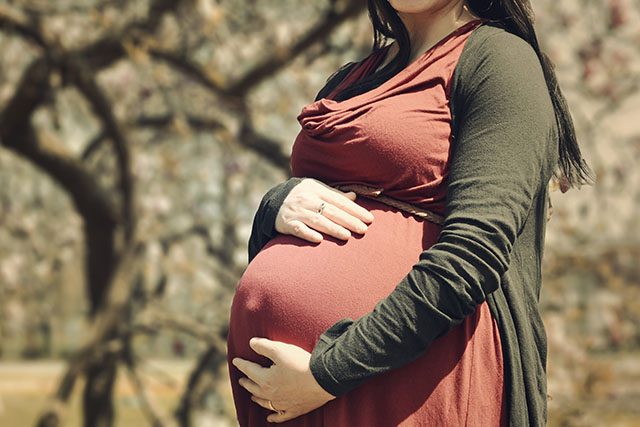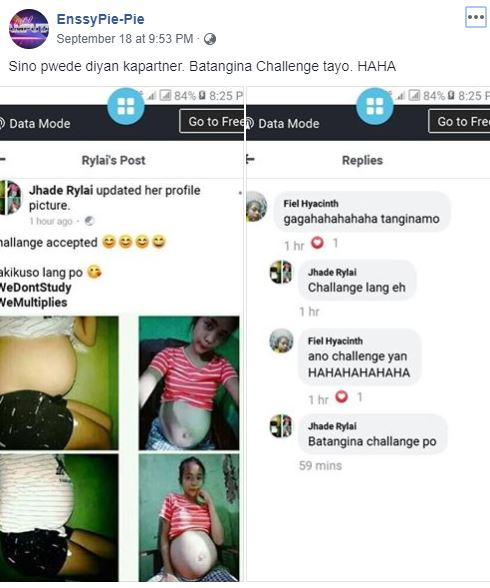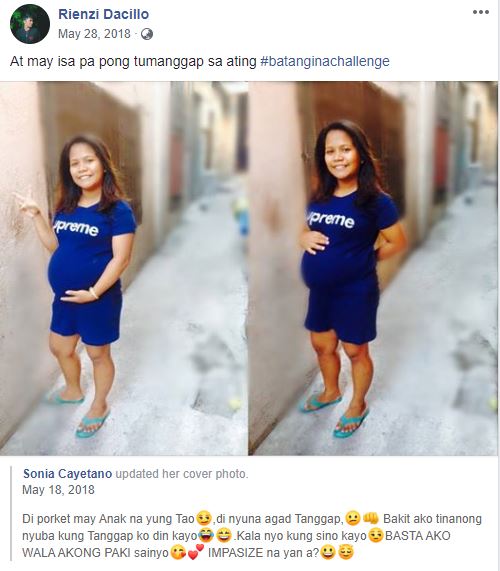
A Facebook user was criticized for promoting “#BatangInaChallenge” through a profile picture in which she glorifies underage pregnancy among girls.
User Jhade Rylai gained attention for uploading a picture of a visibly pregnant young lady and stated she was riding a so-called trend that appeared to encourage underage girls to become mothers as early as possible.
Her caption reads, “Challenge accepted. Nakikiuso lang po. #WeDontStudy #WeMultiplies.”
A friend of Rylai reacted to the picture in the comments section but the latter only repeated what was written on her caption.
“Challenge lang eh,” Rylai responded.
bAtAngiNachALLenGe.jpEg
Posted by Kevin Grey Salas on Tuesday, September 17, 2019
Her post immediately gained criticisms from the online community, where it was described as “quite disturbing.”
“Why would they dare a child to be a mother the soonest? Who the f**king sick mind thought of this? We badly need sex (education) taught mandatorily in our schools NOW,” a Twitter user said.
This passed through my facebook wall. It is quite disturbing, especially the hashtag.#batanginachallenge ?Why would they dare a child to be a mother the soonest? Who the fucking sick mind thought of this?
We badly need sex ed taught mandatorily in our schools NOW pic.twitter.com/8a0wszeDoA— Nag-uyong Del Pilar (@Simply_Clinton) September 19, 2019
It also caused others—particularly males—to irresponsibly promote teenage pregnancy as well.


Stolen picture?
The controversial picture appeared to be taken from another Facebook user entirely.
A search on the social media platform about a certain “Jhade Rylai” does not currently yield a profile, only people with similarly-spelled names.
Another Facebook user claimed that “Jhade Rylai” was not the one on the picture but rather, her friend’s former classmate.
“‘Yung pic na ginamit. Dati po siyang kaklase ng friend ko,” the Facebook user alleged.
Another user offered a link to the picture’s supposed origin.
The link revealed a post from a Facebook page called “Batang Ina” which shares content related to pregnancy and motherhood of young women or teenage girls.
The particular post where the collaged pictures that “Jhade Rylai” uploaded as her own was actually posted on July 18, 2019 and credited to a certain Leslie Ann Unay Alcera.
My Life My Everything👶Hi Baby👶palagi mong tatandaan na ..kahit tayo lang kaya natin to!kahit sinasabi nila mahirap…
Posted by Batang Ina on Thursday, July 18, 2019
There was no mention of a “#BatangInaChallenge” in the July 2019 post.
The caption bared sentiments of a teenage mother who was anticipating the birth of her then-seven-month-old child. Its excerpt reads:
“(Kwestyunin) man nila ang pagiging isang BATANG INA ko, ipapakita ko naman sa kanila na kaya ko, at magiging isang responsableng ina ako sa’yo! Aalagaan kita sa paraang alam ko!”
In its comments section, Alcera shared that she was 17-years-old when the picture was taken.

Earliest mentions of the “#BatangInaChallenge” appear to be around 2018, when a Twitter user wondered if it was supposed to be a new “challenge” among social media users.
hi good morning! i know it's hella early for this pero bagong challenge ba ngayon sa facebook yung "batang ina" challenge?
— ً (@isabelvlsco) May 28, 2018
Days before the Twitter post, a Facebook user shared a picture of a young mother and said that the latter “accepted” their so-called “#BatangInaChallenge.”

The original post, uploaded by a certain Sonia Cayetano, does not specifically mention the controversial hashtag.
The problem with teenage pregnancy
Earlier this month, the Department of Education noted that the rise of females dropping out of school as of late was attributed to underage pregnancy.
Education Secretary Leonor Briones cited data from the Philippine Statistics Authority who reported that dropouts among Filipinos have reached more than 2.97 million.
A total 61.9% of these were girls ages 16 to 24 who were forced into “marriage or family matters,” it said.
Rep. Sol Aragones (Laguna, Third District) mentioned that such cases can be avoided if Filipinos talk and act responsibly about the topic of sex.
She added that Filipino youth continues to have limited access to sex education and reproductive health services.
“Teenage pregnancy perpetuates the cycle of poverty and inequality, as it does not only negatively impact the lives of young parents and their children, but also disenfranchises them from economic opportunities as adolescent pregnancy forces a majority of teenage parents to abandon their education,” Aragones said.
Last month, the Commission on Population and Development disclosed that an average of 530 Filipino teenagers get pregnant daily, with the figure not going below 500 since 2010.
POPCOM executive director Juan Perez III stated that having a child at a young age significantly affect the teenager’s education and income.
“They may have dropped out of school. That affects their wage income, so the wage income of teen parents is much lower than the average. The danger (is) looking for jobs so that’s a big loss for young women of emerging families,” he said.
Socioeconomic Secretary Ernesto Pernia called the rise of teen pregnancies a “national social emergency.”









